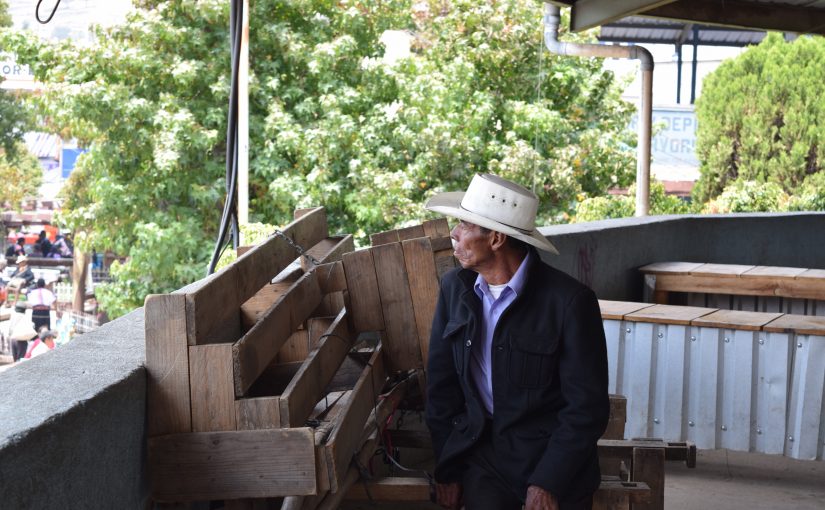In K’iche’, the positional k’o and other words derived from it refer to location and existence. Its range of meanings include “to have,” “to exist,” and “to be.”
Le yawab’
Are taq xojopan pa le qo’ch, xpe le ajkun, xuta che le numam: “¿La k’ax k’o la tat?” “Je’, k’ax,” xcha le numam. Le ajkun utz uq’atuxik xub’ano, xuriqo jas k’ax chech le numam, k’a te k’u ri’ xuya kan le ukunab’al cher are le rora chi’l le sik’. Ruk’ la’ xji’ wi le numam, no’jimal xtani’ le q’oxom, xkunatajik! Sib’alaj xki’kotik je wa’ xub’ij chqech: “Chink’asa chi na keb’, oxib’ q’ij chixo’l walk’wal”, qonojel sib’alaj xojki’jotik, k’a te k’u ri’, xojwarik.
One day, my grandfather got sick. His stomach hurt. My siblings quickly had a meeting. They were there and I was there, too. We discussed what we were going to do in order to cure him. We decided that it was necessary that some of us went to the doctor (curandero). It was also necessary that someone stay with my grandfather. We split up, my aunt would go to her house. My wife came and said to her “Stay a bit, aunt, have something to eat here.” “Alright,” said my aunt. My older brother stayed with my grandfather, we went, with my younger brother and my uncles to the doctor. When we got to his house, my younger brother said “Are you home, sir?” “I am. Have you been here?” said the doctor. “We haven’t, we came to you; we want we want you to come look at our grandfather because he is very sick (is in a lot of pain)”, said my younger brother. “Alright,” said the doctor, “but it is necessary that you all are there so you can know what is wrong with him.” “Alright, sir,” we all said.
When we arrived at our house, the doctor came, and he asked my grandfather, “Does something hurt (is something wrong), sir.” “Yes, it does,” said my grandfather. The doctor examined him carefully, he found what was wrong with my grandfather, and then he left him medicine, which is rora (ruda) and a sik’ (puro). My grandfather was massaged with that and slowly the pain stopped. He was cured. He was happy and said, “There is still sometime with my kids (lit. there are a few days left among my children).” We al got really happy, and then we went to sleep.
Intransitive positional verb k’oji’(k):
Incompletive aspect
Completive aspect
Imperative aspect (stem: k’ol)
Perfective aspect (stem: k’olinaq)
Stative form (stem: k’o/ k’olik)
Negated stative (maj)
Where are you going? – I am not going anywhere.
Possession: k’o + possessed noun
Some examples:
The man is at home.
The people were at the party (fiesta).
We have been there in town.
Our relatives were not there when we arrived at their house.
Stay a while. Don’t go yet (formal).
| Ajkun | doctor, curandero, healer |
| Kunab’al | medicine |
| Yawab’ | sick |
| K’ax | pain, ailment |
| “Utz b’a la” | “Alright, then.” Common phrase to express agreement. |
| Amaq’ | country |
| Nimaq’ij | party, celebration, fair |
| B’is | sadness |
Translate the following sentences to K’iche’:
- Is your father home, children?
- There is no one home.
- Have you (alaq) been in the town behind that mountain there?
- Do you have your medicine?
- Were you at the party?
Answers
- La k’o le itat, ak’alab’.
- Maj k’o pa ja.
- La k’olnaq alaq pa le tinamit je la’, chirij le juyub’
- La k’o akunab’al.
- La xatk’oji’ pa le nimaq’ij.
Translate the following sentences to English:
- Naj xujk’oji’ pa tinamit aretaq xujb’e pa nimaq’ij.
- Jawi k’o wi le ro’ch le ajkun?
- Naj k’o wi le tinamit che le wo’ch.
- In k’olinaq pa le amaq’ Estados Unidos.
- La katk’oji’ na, nan?
Answers
- We stayed a long time in the town when we went to the party.
- Where is the doctor’s house?
- The town is far from my house.
- I have been to the United States.
- Will you still be here, ma’am?
